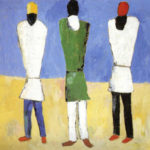We run our website the way we wished the whole internet worked: we provide high quality original content with no ads. We are funded solely by your direct support. Please consider supporting this project.

The Trap of Religious Idolatry
We live in a world that seems to be full of religious idols. These are beliefs, rituals, and behaviors from which religious people draw life. Religious idolaters of course don’t recognize their idols as such. However, we can try to get “life” from believing the “right” things and acting the “right” way in the same way that others might get life from secular idols.
Jesus suggested that those who strive to get life from religious idols are actually further from the true source of life precisely because religious idols don’t appear to be idols. He told us that those who are sick are more likely to receive a physician, while those who mistakenly think they are healthy ignore him (Matt 9:12). Therefore, Jesus proclaimed that the prostitutes and tax collectors would enter the kingdom of God before the Pharisees, the religious idolaters of the day.
The issue is not what kind of idols we embrace, but whether we are trying to fill the void in our souls with an idol at all. So long as we strive to get life from an idol of any sort, we block ourselves off from the true source of life.
Since a religious idol requires that our sense of worth is associated with our religious performance, the idol itself usually looks good. Actually, they will look better on the surface than those who have a genuine relationship with God. Looking good is the religious idolater’s way of life. They are vigilant about their own beliefs and behavior. And they are vigilant in telling other people that they don’t measure up to their religious standards.
The fact is that the Pharisees looked better than Jesus and his disciples—on the surface—and the Pharisees knew it.
This hypervigilance is evidence not of genuine spiritual health but of an inner emptiness and sickness. It is evidence of a spiritual pathology. The attempt to fill the emptiness with the right beliefs and right behaviors rather than God prevents them from ever getting their emptiness really filled.
Religious idolatry can placate the emptiness for short periods of time. When our religious beliefs and strategies are successful in the short run, we derive some surrogate life by believing we do all the right things, embrace all the right interpretations of Scripture, hold to all the right doctrines, engage all the right rituals, and display the right spirituality.
But it does not stop there. Those who practice religious idolatry get even more surrogate life by looking down on those who don’t do and believe all the right things that they do. Then they may experience even more surrogate life through “holy anger” toward those who do not conform to their way of thinking and behaving.
But these positive surrogate feelings are fleeting. The emptiness returns, driving religious idolaters to repeat their futile attempts to get life by their religion.
As long as we strive to get life from the rightness of our beliefs and behaviors, we will be caught in a never-ending loop of trying to get our religion right. We cannot correct this by simply trying harder to perfect our beliefs and behaviors. Religious idolatry can only be cured when we wake up to the futility of our idolatry and realize God’s love is the one thing that can fill our souls. Only when we receive God’s love, given to us in Christ, as an unconditional, free gift can we ever be free.
—Adapted from the book: Repenting of Religion. Pages 82-90
Category: General
Tags: Identity in Christ, Idolatry, Life in Christ
Related Reading

Sermon: Reframing the Sun
In our clip from this weeks sermon, Greg Boyd talks about how we respond to misfortunes and tragedies depends on how we frame them. In Colossians 3, Paul writes that Christ is all and is in all. When we frame our life within this understanding, we begin to see how we can live through misfortunes…

What is “Original Sin”?
I get asked about “original sin” quite a bit. Are people born guilty? Many times questions like this originate from folks who are worried about whether babies who die without being baptized go to hell. This is what I was taught as a young Catholic boy, and I have to confess I now find the…

Feeding Our Hungry Hearts
Jesus came into a world that was full of hungry hearts (see previous post) to introduce us to the only thing that can feed those hungers. Jesus came to rescue us from the futile feeding frenzy of trying to feed ourselves on idols. Throughout the Bible, we read story after story of people trying to…

Why Do Christians Keep Struggling With Sin?
If we truly are righteous in Christ Jesus (see Earlier Post about our identity in Christ), why do we need to be reminded to live righteous lives? If we are new creations and have a new name (2 Cor 5:17), why do we still struggle with sin? If I am filled with God’s Spirit, the…

Judgment and Idolatry
Why was the forbidden tree in the center of the garden called The Tree of the Knowledge of Good and Evil? Since the Bible depicts eating from this tree as the reason humans are estranged from God and the cause of all that’s wrong with humanity, eating from this tree is obviously a terrible thing.…

What’s the Purpose of Old Testament Law?
Understanding the law in the Old Testament can prove difficult. For instance, Paul believed that the law is good and holy (Rom 7:12). However, he also said that it only serves to expose and even increase sin (Rom 5:20; 7:5-11). He wanted to carry out the law, but he also found himself unable to do…
